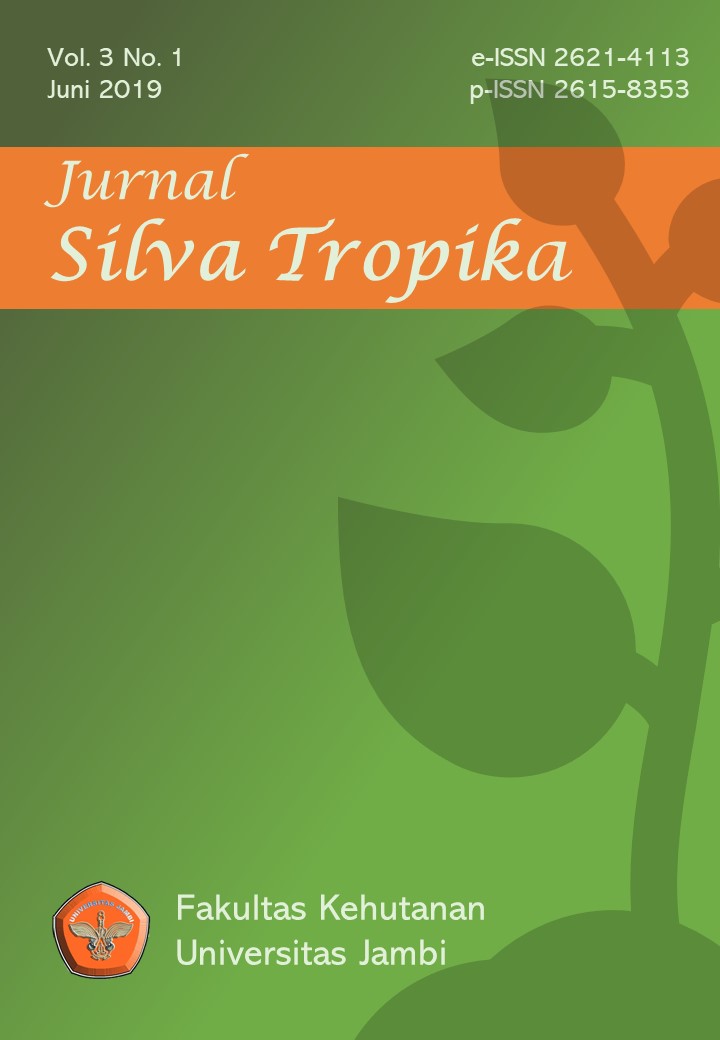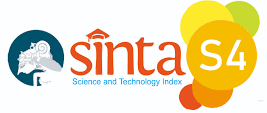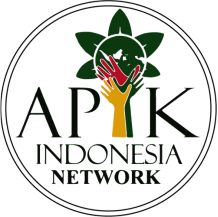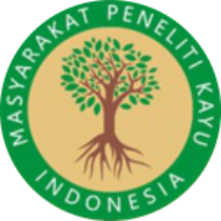Contribution of Soil and Under Storey Carbon Stock in Post Burned Peat Ecosystem as Carbons Storage on Tropical Land
DOI:
https://doi.org/10.22437/jsilvtrop.v3i1.6407Keywords:
carbon, peat, rehabilitationAbstract
ABSTRACT
Forest and peatland fires in the tropics occur on a large scale and cause environmental damage in the lungs of the world. The flames on the burning peat mix with water vapor inside the peat and produce a lot of smoke. The carbon which was previously buried in the soil and stored in stands above it became exposed and united in the life and human environment. It is very important to know the total carbon stocks in peat to see its contribution as carbon sequestration and carbon storage in stabilizing the ecosystem for rehabilitating peatlands in the tropics which are the lungs of the world. This research is limited to the estimation of carbon stocks stored in peat and understorey soil at the rehabilitation site of the Orang Kayo Hitam forest park. The estimation of soil carbon stocks is carried out by measuring the depth of peat at 48 drill points that are systematically placed. The estimation of understorey carbon stocks is carried out by destructive sampling method on a 0,5 x 0,5 meter plot which is repeated 3 times. The results showed that the peat depth varied from 7,2 - > 10 meters. The mean of understorey carbon stocks is 7.74 tons/ha while the mean of soil carbon stocks is 33.183,67 tons/ha.
Downloads
References
Agus F. 2009. Cadangan Karbon Emisi Gas Rumah Kaca dan Konservasi Lahan Gambut. Prosiding Seminar Dies Natalis Universitas Brawijaya ke 46. 31 Januari 2009. Malang.
Dinas Kehutanan Provinsi Jambi. 2014. Taman Hutan Raya (Tahura) Sekitar Tanjung menjadi urusan pemerintahan Provinsi Jambi.
Febriani I, Prasetyo LB, Dharmawan AH. 2017. Analisis Deforestasi Menggunakan Regresi Logistik Model di Tahura Sekitar Tanjung Provinsi Jambi. Jurnal Pengelolaan Sumberdaya Alam dan Lingkungan Vol. 7 No. 3: 195-203.
Giesen W. 1991. Berbak Wildlife Reserve, Jambi. Reconnaisance Survey Report. PHPA/ AWB Sumatera Wetland Project Report No.13. Asean Wetland Bureau- Indonesia. Bogor.
Hairiah K, Rahayu S. 2010. Mitigasi Perubahan Iklim Agroforestri Kopi untuk Mempertahankan Cadangan Karbon Lanskap. Seminar Kopi. Denpasar Bali, 4 – 5 Oktober 2010. Pusat Penelitian Kopi dan Kakao Indonesia.
Kelompok Kerja Pengelolaan Lahan Gambut Nasional. 2006. Strategi dan Rencana Tindak Nasional: Pengelolaan Lahan Gambut Berkelanjutan. Departemen Dalam Negeri. Jakarta. Indonesia.
Keputusan Menteri Lingkungan Hidup dan Kehutanan Republik Indonesia. 2017. Penetapan Kawasan Hutan Taman Hutan Raya Orang Kayo Hitam. Nomor: SK.1973/MENLHK-PKTL/KUH/PLA.2/4/2017. Jakarta. Indonesia.
Kirana AP, Sitanggang IS, Syaufina L. 2016. Hotspot pattern distribution in peat land area in Sumatera based on spatio temporal clustering. International Symposium on LAPAN-IPB Satellite for Food Security and Environmental Monitoring 2015, LISAT-FSEM 2015. Procedia Environmental Sciences 33 (2016) 635–645.
Murdiyarso D, Rosalina U, Hairiah K, Muslihat L, Suryadiputra INN, Jaya A. 2004. Petunjuk Lapangan: Pendugaan Cadangan Karbon pada Lahan Gambut. Proyek Climatee Change Forest and Peatlands in Indonesia. Wetlands International Indonesia Programme and Wildlife Habitat Canada. Bogor. Indonesia
Najiyati S, Muslihat L, Suryadiputra INN. 2005. Pengelolaan Lahan Gambut untuk Pertanian Berkelanjutan. Wetlands International–Indonesia Programme. Bogor. Indonesia.
Noor M. 2001. Pertanian Lahan Gambut: Potensi dan Kendala. Penerbit Kanisius. Yogyakarta.
Nurdiana A, Setiawan Y, Pawitan H, Prasetyo LB, Permatasari PA. 2016. Land changes monitoring using MODIS time-series imagery in peat lands areas, Muaro Jambi, Jambi Province, Indonesia. The 2nd International Symposium on LAPAN-IPB Satellite for Food Security and Environmental Monitoring 2015, LISAT-FSEM 2015. Procedia Environmental Sciences 33 (2016) 443–449.
Nurjanah S, Octavia D, Kusumadewi F. 2013. Identifikasi Lokasi Penanaman Kembali Ramin (Gonystylus bancanus Kurz) di Hutan Rawa Gambut Sumate dan Kalimantan. Pusat Penelitian dan Pengembangan Koservasi dan Rehabilitasi, Badan Penelitian dan Pengembangan Kehutanan. Forda Press, Bogor.
Prasetyo LB, Dharmawan AH, Nasdian FT, Ramdhoni S. 2016. Historical forest fire occurrence analysis in Jambi Province during the period of 2000–2015: its distribution and land cover trajectories. 2nd International Symposium on LAPAN-IPB Satellite for Food Security and Environmental Monitoring 2015, LISAT-FSEM 2015. Procedia Environmental Sciences 33 (2016) 450–459.
Wahyunto, Ritung S, Subagjo H. 2003. Peta Luas Sebaran Lahan Gambut dan Kandungan Karbon di Pulau Sumatera / Maps of Area of Peatland Distribution and Carbon Content in Sumatera, 1990 – 2002. Wetlands International – Indonesia Programme and Wildlife Habitat Canada (WHC). Bogor.
Wahyunto, Ritung S, Subagjo H. 2005. Sebaran Gambut dan Kandungan Karbon di Sumatera dan Kalimantan. Proyek Climate Change, Forests and Peatlands in Indonesia. Wetlands International – Indonesia Programme and Wildlife Habitat Canada (WHC). Bogor.
Wibowo A, Samsoedin I, Nurtjahjawilasa, Subarudi, Muttaqin Z. 2013. Petunjuk praktis menghitung cadangan karbon hutan. Pusat Penelitian dan Pengembangan Perubahan Iklim dan Kebijakan Badan Penelitian dan Pengembangan Kehutanan Kementerian Kehutanan, Republik Indonesia. Kerjasama dengan United Nations Educational, Scientific and Cultural Otganization (UNESCO). Bogor.
Additional Files
Published
Versions
- 2019-09-03 (1)
- 2019-09-03 (1)
















